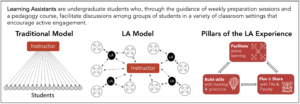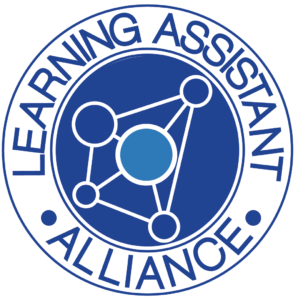Mission: Our mission is to empower learning assistants to spark growth, connection, and confidence in every student they support. Through training, mentorship, and community, we help LAs develop as leaders who make a lasting impact on the future of learning and the community at the University of Utah.
Welcome to the Learning Assistant Program at the University of Utah!
-

The beneficial effects of Learning Assistants (LAs) on student experience and achievement is an ongoing and well-documented investment in the transformative power of learning, the benefits extend significantly to the LAs themselves. Through their work, LAs deepen their understanding of core disciplinary concepts, which can enhance their performance in all courses. They also develop crucial listening skills and relay valuable feedback from students to their instructional teams, advocating for targeted instructional support. Learning Assistants collaborate with instructional teams and learning communities. Participation in SCI 5050: The Science of Learning provides LAs with opportunities to connect with peers, access on-campus resources, and build professional relationships. Through this course, LAs gain insights into the psychology and science of teaching and learning. They explore concepts such as Growth vs. Fixed Mindset, Imposter Phenomenon, and the structural inequities affecting students' mastery levels. This knowledge equips them with best practices to participate in, and lead, productive, collaborative problem-solving discussions.
Faculty members who are interested in having LAs in their classroom should reach out to their department coordinators or email la-program@utah.edu
The Learning Assistant program at the University of Utah started in 2017 and is based on the program model developed by University of Colorado Boulder. Additional information about the origins and impacts of the Learning Assistant model is available on the University of Colorado Boulder’s website.
You can also find more information and available trainings at the Learning Assistant Alliance website.

Meet Our Learning Assistants!
Learning Assistants have the ability to positively improve their peers' learning journeys in a multitude of ways. Not only do Learning Assistants have an opportunity to build meaningful relationships with instructors and their fellow students, but solidify their own understanding of the subject matter, learn the actual science behind learning through our pedagogy course, SCI 5050: The Science of Learning that all new LAs will complete, and gain confidence and leadership skills to support your peers!
We encourage anyone interested in becoming an LA to read in their own words how the experience has affected their own educational experiences.
-
Learning Assistants (LAs):
- Role: LAs primarily focus on supporting students in understanding course material through peer-to-peer interaction. They assist with group discussions, provide feedback on assignments, and help clarify concepts. Their role is more about fostering a collaborative learning environment and enhancing student engagement.
- Skills Developed: LAs refine their communication and facilitation skills, deepen their understanding of foundational concepts, and learn to navigate and address diverse student needs. They also gain insights into the psychology of learning and educational equity.
Teaching Assistants (TAs):
- Role: TAs typically support the instructor with a broader range of responsibilities, including grading, leading lab or discussion sections, and sometimes delivering lectures. Their role often involves a mix of administrative tasks and direct instruction, working closely with the course content and helping manage classroom dynamics. TAs may also be responsible for grading.
Collaborative Potential:
- Sharing Resources: TAs can provide LAs with valuable resources such as lesson plans, teaching materials, and supplementary readings. In return, LAs can share insights from their direct interactions with students, including common questions and misunderstandings, which can help TAs refine their materials.
- Co-Planning Lessons: TAs and LAs can collaborate on lesson planning. TAs can guide LAs in designing engaging and effective lessons, while LAs can offer practical feedback on what works well with students based on their hands-on experience.
- Peer Observation: TAs can observe LAs to provide feedback, but LAs can also observe TAs in action. This mutual observation helps both parties learn from each other’s strengths and areas of expertise.
- Professional Networking: TAs can introduce LAs to professional networks and opportunities within the academic community, such as conferences, workshops, or research groups. Conversely, LAs can share their insights into student engagement and current trends in student learning, which can be valuable for TAs.
- Reflective Discussions: Regular discussions about teaching practices, classroom challenges, and student progress can help both TAs and LAs refine their approaches. These reflective conversations provide a platform for sharing experiences and strategies.
- Feedback Loops: Establishing feedback loops where TAs and LAs regularly provide constructive feedback to each other can enhance teaching practices. TAs can give feedback on instructional techniques, while LAs can offer insights on student reactions and engagement.
By fostering a collaborative and supportive relationship, TAs and LAs can enhance their own professional development and improve the overall learning experience for students. By leveraging their respective strengths and collaborating effectively, LAs and TAs can create a more dynamic and supportive learning environment that benefits both students and the educational team.
Our Program's Legacy
Since the Fall 2017 semester, the Learning Assistant has continually been a part of the College of Science's student success. The Learning Assistant Program has grown from assisting the Physics & Astronomy department during its inaugural year to placing over 240 Learning Assistants in Atmospheric Sciences, Biology, Chemistry, Geology & Geophysics, Mathematics, Physics & Astronomy, and Science Research Initiative (SRI) in the Spring 2025 semester!
Click below to view the names of all the students that have been a part of the Learning Assistant Program and watch as we continue to grow. Thank you for being part of our story.
-
The Learning Assistant Program will do our best to collaborate with departments to ensure Learning Assistant (LA) coverage in the courses that have been requested. Please note that adjustments may be necessary based on our program capacity. We appreciate your flexibility and understanding as we work to support as many courses as possible during our Fall 2025 term.
We appreciate your flexibility and understanding as we work to support as many courses as possible during our Fall 2025 term.
-
Before applying:
- Please review program information and eligibility requirements.
- Double check your class schedule
- Information regarding available courses will be on the application
-
Thank you for your interest in utilizing Learning Assistants!
Please contact your Department Coordinator to find out if Learning Assistants make sense for your course and your goals:
Biology: Julie Hollien
Chemistry: Renee Laws
Math: Matt Cecil
Physics: Claudia De Grandi
Atmospheric Sciences: Brenda Bowen
Geology & Geophysics: Peter Lippert
Science Research Initiative (SRI): Josh Steffen
CONTACT US
The College of Science Learning Assistant Program is administered by staff at the Center for Science & Mathematics Education.Caitlin Gensler
Education Director
Caitlin.Gensler@utah.edu
Kendall Van Horssen
Program Manager
Kendall.VanHorssen@utah.edu
